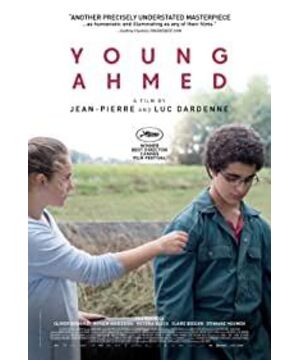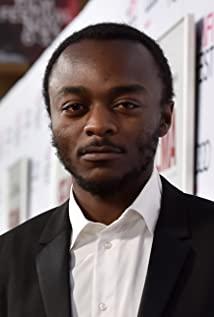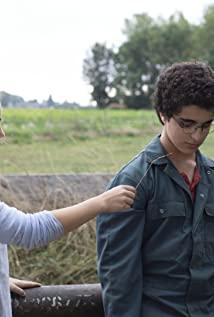"Young Ahmed" is the tenth work of the Dane brothers since they have been in the industry for 28 years. In addition to the continuation of style and technique and a firm position of realism, this is also the second work following "One Promise", "Rosetta" and "The Bicycle Boy". "After the fourth teen theme. In this new work, many commonalities in the works of the Darney brothers can still be found. At the same time, this new work has specialities that cannot be ignored and explores more angles of characters in its work sequence.
As a fan of the Darney Brothers, my entry into this film is not a social expression, some current world symptom, or a technique innovation like changes in the length of shots in a single scene (more coherent and relatively stable), or extreme people. Whether or not it is a betrayal of realism, and focusing only on the characters themselves, and the consistency and difference in the structure of the play and the way they are written relative to their other films.
An important motif of Darnay's films is the process of finding or re-believing in humanity/love. In the opening scene of their film, the protagonists are abandoned and socially excluded loners who are on the verge of modernization. In a social jungle of indifference. The starting point for the development of a character’s withdrawn personality and the development of personality distortion is often an incomplete family. One of the parents of the protagonist in Darnay’s films must be missing, and the other cannot take on the responsibility of parents or give normal parents the right to their children. Influence. In "One Promise", Egg's father is selfish and inhumane. With the change of the protagonist's position, he even becomes an inevitable villain (representative of the dark side of society) in Darnay's films; Rosetta's mother has been drinking for a long time, living a depraved life, and the family Rosetta's burden falls entirely on Rosetta's shoulders; Cyril is abandoned by his father in "The Biker". The fragmentation of the family is also the fundamental factor behind the young Ahmed's slipping off the track of ordinary teenage growth. His mother is also alcoholic and faces the inability of parent-child communication.
In the process of growing up lacking due love, the protagonist will gradually grow a self-protective Linjia, maintaining vigilance and resistance to the external world, in order to resist the insecurity of being in a vulnerable real situation. Egg masters the laws of survival and becomes an exploiter, while Rosetta and Cyril wrap themselves in loneliness and sensitivity. Religion (from the family) is the source of Ahmed's sense of belonging. Let's ignore for the time being whether the Dane brothers intend to criticize religion. Here, religion itself constitutes a solid spiritual support, which is passive acceptance and moral hesitation compared to Dane's other characters. Ahmed is so active, firm, and consciously relying on this spiritual asylum, the unity, principled and powerful inquiring power of Islamic regulations and the disorder, danger and chaos of Ahmed's living environment have huge implications. The contrast brought him the illusion of being in the collective and accepted by the collective, and at the same time, it continuously deepened the crack and isolation between him and the external world in his consciousness, and played a positive feedback role with each other.
The rejection mentality of the characters, the Dane brothers tend to be externalized to external features or actions, the boots that Rosetta put on repeatedly, here on Ahmed's hand washing/(hand) brushing teeth, this action is not only a symbol of In addition to the meaning of sex, it also shares the role of the period in regulating the rhythm of the film with "worship". There are four times in the film where the worship scene is presented head-on. The first time is in the prologue stage when the main story is not unfolded in the first ten minutes. Smug and ready to go, the third time with the meaning of forcing himself (to continue the assassination), distressed but still firm, the fourth time after kissing Louise, with remorse and self-denial. The emotional state of Ahmed over several weeks divides the film into five narrative units like a metronome (Prologue - Argument of the Arabic Professor, Attacking the Teacher for the First Time - Coming to the Farm, Seeing the Teacher Again - and Louie Silk develops feelings, escapes the farm—the climax of the ending) and pushes the characters forward.
Ahmed tried to kill Ines three times, the first motive can be considered to seek religious identification and emphasize his piety towards his faith. After the failed assassination, Ahmed was denied by the imam he had previously admired and was sent to the farm for indoctrination and reformation. Instead, Ahmed felt uneasy about caring and understanding, a belief that was breaking away from the belief that gave him a sense of existence. Ahmed said to his mother who came to visit him: "They were so good to me that I couldn't stand it, and I hope they were a little bit worse on me." This line accurately reveals Ahmed's mentality here, although his It is true that there is a certain degree of inspiration from within (from calculating the conflict between worship and other activities to the fact that he almost forgot to be reminded by the farmer to pray), but the spiritual coercion of religion still prompts Ahmed to use it. Acting to prove himself and prevent him from stepping out of the comfort zone of providing himself with faith support, it is not difficult to understand that he continued to try to hurt his teacher twice since then, which is a different kind of behavior than the characters in the previous Darney Brothers films. The spiritual dilemma of moral dilemmas.
In the understanding of the Darney brothers, human nature is naturally good, but it will be contaminated by harsh environments, so it can also be redeemed by others. Darney's films are binary, light and dark are clearly distinguished, and the protagonist is in the The middle ground between the two swings from left to right, so in their films, they often see the image of a redeemer. In "One Promise", Egg's hardness is gradually softened in his dealings with black mothers. "Rosé" In The Tower, the boy constantly gives the heroine care and trust, and at the end of the powerless, riding a bicycle appears to inject the power of humanity into the tragic and helpless situation again. In The Son of Others, the father who lost his child and the little enemy redeem each other. In The Silence of Her Majesty and The Nameless Girl, the protagonist himself is the savior. This is a huge subversion of the self in "Young Ahmed" by the Darney brothers. Audiences who are familiar with them will naturally think that the kindness of social workers will save Ahmed, and that Louise's love will change Ahmed. Ines' tolerance and fraternity will influence Ahmed (the ending Ines is about to rescue Ahmed is actually more dramatic), but the final text shows that under the strong extreme and control of religion over people, and There is no external savior, only an individual's inner struggle, and those acts of goodwill around him are instead making him bounce to a more extreme opposite.
The Darney Brothers' drama skills, which are not weaker than the mise-en-scene, are also fully reflected in the climax paragraphs. In "One Promise" or "Children", we can clearly feel the progression of the character arcs step by step. The full response of the unsuspecting characters in the environment and in the relationship makes the emotional placement of the ending convincing. And I glanced at the progress bar when Ahmed climbed over the wall and planned to hurt Ines for the third time. It seemed that it was less than ten minutes before the end. I really sweated for the Dane brothers here. How will they let him fall to the ground in a few minutes for a character who is not worth the money? In fact, the Darney brothers did let him fall to the ground. The visual image of "falling" symbolizes that Ahmed's situation has changed from active to passive. Turning from the intruder to the one to be rescued also represents the return of his extreme will. I have to admire the subtlety of this brushstroke. A drop in space has rich meanings. This seems to be the only and most amazing way of writing. At that moment, there is no need to lay out or advance the arc, and the huge twist of the plot passes through the characters. His physical perception stirred the fusion in his soul, Ahmed softly called "Mom", struggled to take out the "weapon" originally used to attack Ines, twisted his body close to the side of the road, and knocked on the side of the road. Survival, the return of human nature happened in an instant, but it was so shocking and real that people couldn't help but believe it. No outside guidance is needed, and only when he comes to the brink of death can he realize what life means. It is also different from Dane's previous work: the characters' hardness and fragility are alternately expressed ("Rosetta"), and here the characters are not completely relieved until the last moment, and the lethality is not reduced. With such superb and powerful brushstrokes, there are several screenwriters in the world who can do it.
For me, "Young Ahmed" must not be the best Dane brothers, it is too calm and restrained and loses the emotional force that runs through every moment of the film, including the incomplete portrayal of family. in depth. But there is no doubt that they can always have insight into human nature. They can understand from reality why people have lost the ability to love and receive love, and how to regain the ability to love and be loved. They can face people calmly The selfish side under the oppression of the environment can also capture a trace of authenticity and purity in the depths of human nature, which is why I will always love these two brothers.
View more about Young Ahmed reviews










